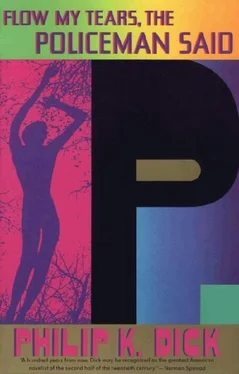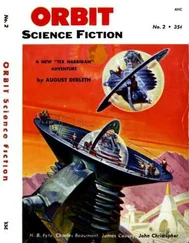“Hi,” he said.
Foggily—because she did not have on her glasses—Ruth Rae lifted her head, scrutinized him. “Hi,” she rasped in her bourbon-bounded voice. “Who are you?”
Jason said, “We met a few years ago in New York. I was doing a walk-on in an episode of The Phantom Baller … as I recall it, you had charge of costumes.”
“The episode,” Ruth Rae rasped, “where the Phantom Baller was set upon by pirate queers from another time period.” She laughed, smiled up at him. “What’s your name?” she inquired, jiggling her wire-supported exposed boobs.
“Jason Taverner,” he said.
“Do you remember my name?”
“Oh yes,” he said. “Ruth Rae.”
“It’s Ruth Gomen now,” she rasped. “Sit down.” She glanced around her, saw no vacant stools. “Table over there.” She stepped super-carefully from her stool and careened in the direction of a vacant table; he took her arm, guided her along. Presently, after a moment of difficult navigation, he had her seated, with himself close beside her.
“You look every bit as beautiful—” he began, but she cut him off brusquely.
“I’m old,” she rasped. “I’m thirty-nine.”
“That’s not old,” Jason said. “I’m forty-two.”
“It’s all right for a man. Not for a woman.” Blearily she stared into her half-raised martini. “Do you know what Bob does? Bob Gomen? He raises dogs. Big, loud, pushy dogs with long hair. It gets into the refrigerator.” She sipped moodily at her martini; then, all at once, her face glowed with animation; she turned toward him and said, “You don’t look forty-two. You look all right! Do you know what I think? You ought to be in TV or the movies.”
Jason said cautiously, “I have been in TV. A little.”
“Oh, like the Phantom Baller Show. ” She nodded. “Well, let’s face it; neither of us made it.”
“I’ll drink to that,” he said, ironically amused; he sipped at his mulled scotch and honey. The pat of butter had melted.
“I believe I do remember you,” Ruth Rae said. “Didn’t you have some blueprints for a house out on the Pacific, a thousand miles away from Australia? Was that you?”
“That was me,” he said, lying.
“And you drove a Rolls-Royce flyship.”
“Yes,” he said. That part was true.
Ruth Rae said, smiling, “Do you know what I’m doing here? Do you have any idea? I’m trying to get to see, to meet, Freddy Hydrocephalic. I’m in love with him.” She laughed the throaty laugh he remembered from the old days. “I keep sending him notes reading ‘I love you,’ and he writes typed notes back saying ‘I don’t want to get involved; I have personal problems.’ “ She laughed again, and finished her drink.
“Another?” Jason said, rising.
“No.” Ruth Rae shook her head. “I don’t drink anymore. There was a period”—she paused, her face troubled—“I wonder if anything like that has ever happened to you. I wouldn’t think so, to look at you.”
“What happened?”
Ruth Rae said, fooling with her empty glass, “I drank all the time. Starting at nine o’clock in the morning. And you know what it did for me? It made me look older. I looked fifty. Goddamn booze. Whatever you fear will happen to you, booze will make it happen. In my opinion booze is the great enemy of life. Do you agree?”
“I’m not sure,” Jason said. “I think life has worse enemies than booze.”
“I guess so. Like the forced-labor camps. Do you know they tried to send me to one last year? I really had a terrible time; I had no money—I hadn’t met Bob Gomen yet—and I worked for a savings-and-loan company. One day a deposit in cash came in … fifty-dollar-bill stuff, three or four of them.” She introspected for a time. “Anyhow, I took them and put the deposit slip and envelope into the shredder. But they caught me. Entrapment—a setup.”
“Oh,” he said.
“But—see, I had a thing going with my boss. The pols wanted to drag me off to a forced-labor camp—one in Georgia—where I’d be gang-banged to death by rednecks, but he protected me. I still don’t know how he did it, but they let me go. I owe that man a lot, and I never see him anymore. You never see the ones who really love you and help you; you’re always involved with strangers.”
“Do you consider me a stranger?” Jason asked. He thought to himself, I remember one more thing about you, Ruth Rae. She always maintained an impressively expensive apartment. No matter who she happened to be married to: she always lived well.
Ruth Rae eyed him questioningly. “No. I consider you a friend.”
“Thanks.” Reaching, he took hold of her dry hand and held it a second, letting go at exactly the right time.
Ruth Rae’s apartment appalled Jason Taverner with its luxury. It must cost her, he reasoned, at least four hundred dollars a day. Bob Gomen must be in good financial shape, he decided. Or anyhow was.
“You didn’t have to buy that fifth of Vat 69,” Ruth said as she took his coat, carrying it and her own to a self-opening closet. “I have Cutty Sark and Hiram Walker’s bourbon—”
She had learned a great deal since he had last slept with her: it was true. Emptied, he lay naked on the blankets of the waterbed, rubbing a broken-out spot at the rim of his nose. Ruth Rae, or rather Mrs. Ruth Gomen now, sat on the carpeted floor, smoking a Pall Mall. Neither of them had spoken for some time; the room had become quiet. And, he thought, as drained as I am. Isn’t there some principle of thermodynamics, he thought, that says heat can’t be destroyed, it can only be transferred? But there’s also entropy.
I feel the weight of entropy on me now, he decided. I have discharged myself into a vacuum, and I will never get back what I have given out. I goes only one way. Yes, he thought, I’m sure that is one of the fundamental laws of thermodynamics.
“Do you have an encyclopedia machine?” he asked the woman.
“Hell, no.” Worry appeared on her prunelike face. Prunelike—he withdrew the image; it did not seem fair. Her weathered face, he decided. That was more like it.
“What are you thinking?” he asked her.
“No, you tell me what you’re thinking,” Ruth said. “What’s on that big alpha-consciousness-type super-secret brain of yours?”
“Do you remember a girl named Monica Buff?” Jason asked.
“‘Remember her! Monica Buff was my sister-in-law for six years. In all that time she never washed her hair once. Tangled, messy, dark-brown ooze of dog fur hanging around her pasty face and dirty short neck.”
“I didn’t realize you disliked her.”
“Jason, she used to steal. If you left your purse around she’d rip you off; not just the paper scrip but all the coins as well. She had the brain of a magpie and the voice of a crow, when she talked, which thank God wasn’t often. Do you know that that chick used to go six or seven—sometimes, one time in particular—eight days without saying a word? Just huddled up in a corner like a fractured spider strumming on that five-dollar guitar she owned and never learned the chords for. Okay, she did look pretty in an unkempt messy sort of way. I’ll concede that. If you like gross tail.”
“How’d she stay alive?” Jason asked. He had known Monica Buff only briefly, and by way of Ruth. But during that time he and she had had a short, mind-blowing affair.
“Shoplifting,” Ruth Rae said. “She had that big wicker bag she got in Baja California … she used to stuff stuff into that and then go cruising out of the store big as life.”
“Why didn’t she get caught?”
“She did. They fined her and her brother came up with the bread, so there she was again, out on the street, strolling along barefoot—I mean it!—down Shrewsbury Avenue in Boston, tweaking all the peaches in the grocery-store produce sections. She used to spend ten hours a day in what she called shopping.” Glaring at him, Ruth said, “You know what she did that she never got caught at?” Ruth lowered her voice. “She used to feed escaped students.”
Читать дальше









